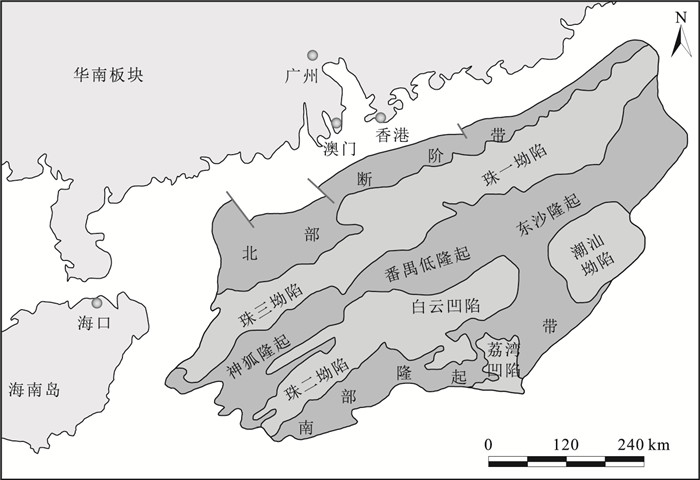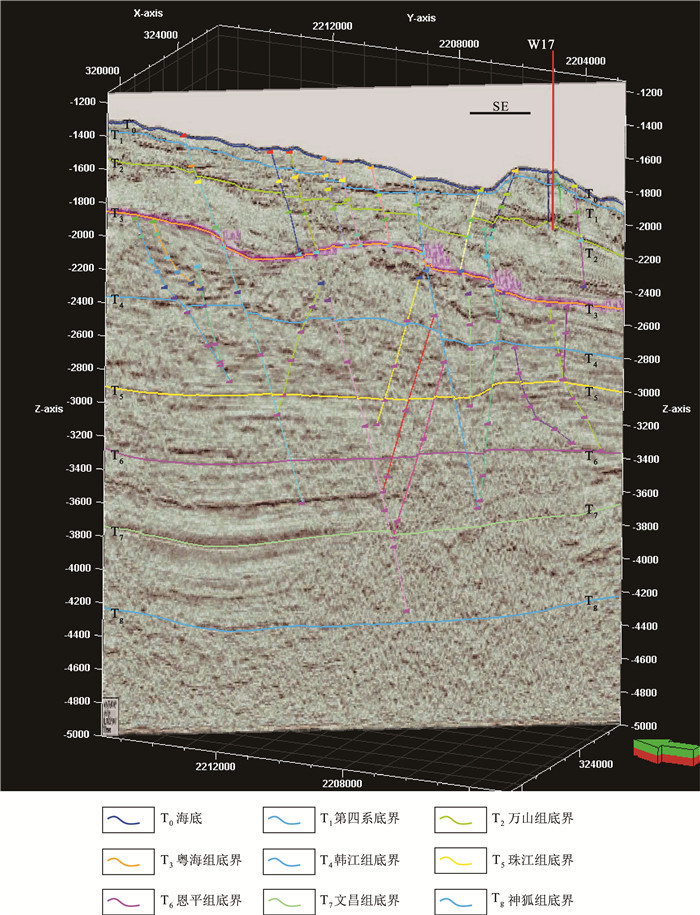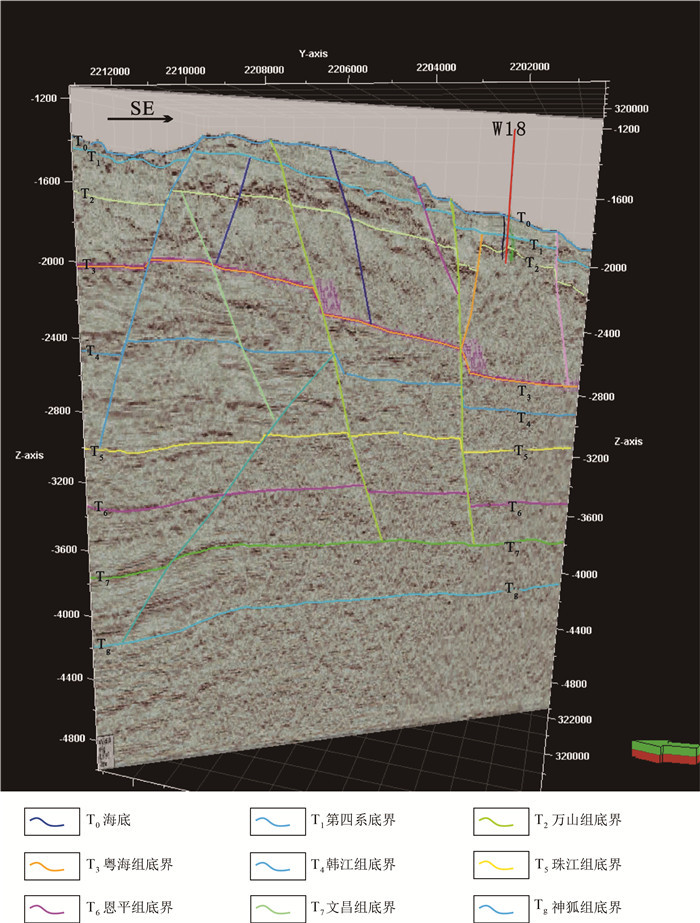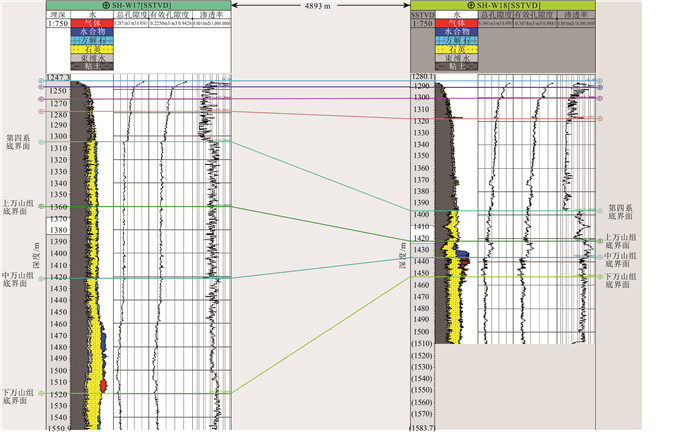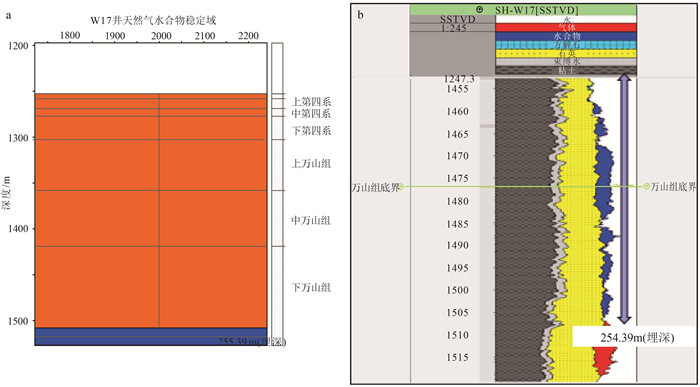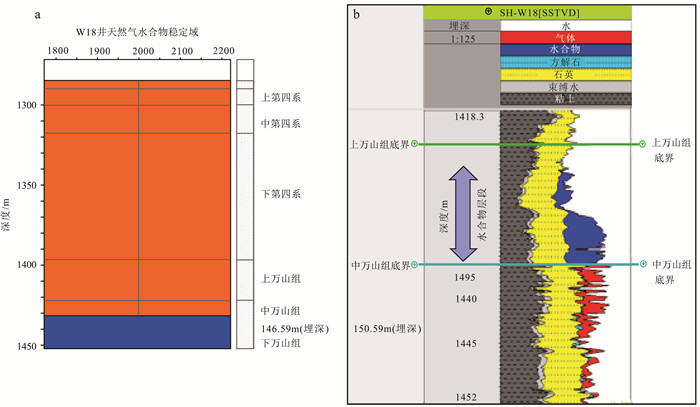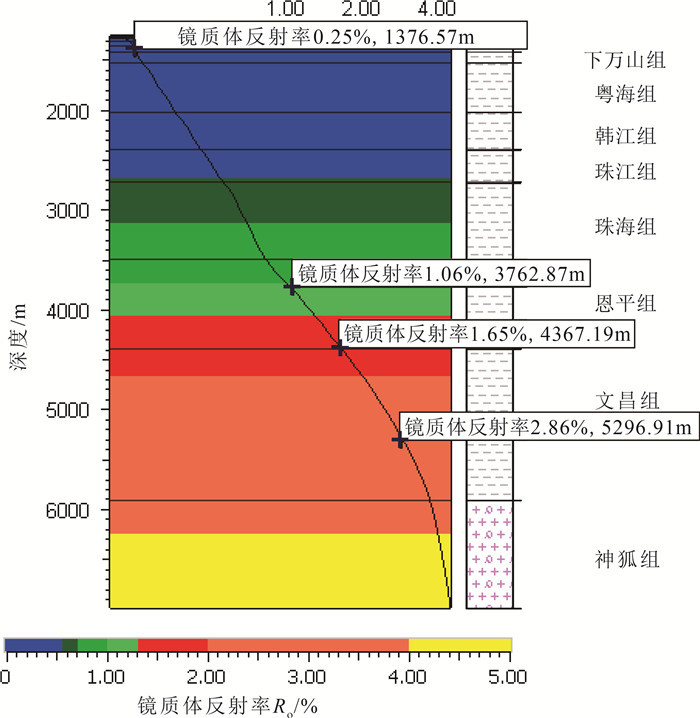Numerical simulation of gas hydrate migration-accumulation system and trial mining optimization of orebodies in the Shenhu area
-
摘要:
为了进一步了解南海北部陆坡神狐海域勘探区天然气水合物成藏系统特征,优选天然气水合物优势矿体,基于经过矿体的地震剖面资料,结合区域成藏地质条件,分别构建了勘探区W17和W18两个矿体的二维地质模型,从天然气水合物成藏的稳定域、气源形成、运移输导及储集成藏进行了系统数值模拟。结果表明:①神狐勘探区成矿气源丰富,来自浅层的生物成因气和深层的热成因气都可作为天然气水合物成藏的气源;②神狐勘探区流体输导条件良好,深部大断裂可以作为油源断裂沟通深部源岩,是连接深部热成因气的主要通道,浅部调节性断裂和渗透性砂岩一起作为横向+垂向复合输导;③在神狐勘探区稳定域内,区域构造部位相对高、断块封闭性相对好、渗透率相对大的区域为天然气水合物成藏的有利储集层;④综合分析认为,W17矿体比W18矿体在气源、运移及储层特性上更具优势,应作为优先考虑的试采矿体。
Abstract:Based on seismic profile data of natural gas hydrate exploration in Shenhu area in the north of South China Sea, combined with geological conditions of regional accumulation, the 2D geological models for the W17 and W18 orebodies in the exploration area were constructed respectively to further understand the gas hydrate accumulation system in Shenhu exploration area of the northern continental slope of South China Sea.A systematic simulation was carried out to test gas hydrate stability zone, gas source formation, migration and accumulation.The results show that: a.the Shenhu exploration area is rich in gas sources, and both the shallow biogenic gas and the deep thermogenic gas can be used as gas sources for hydrate accumulation; b.the Shenhu exploration area has excellent transport system where the deep fault can be used as source fault to connect the deep source rocks and serves as the main channel connecting the deep thermal gas, and the shallow regulatory fracture and permeable sandstone serve as transverse and vertical transportation; c.the areas with relatively good sealing property of fault blocks and relatively high permeability are favorable reservoirs for gas hydrate accumulation.According to the comprehensive analysis, the orebody W17 has more advantages than the orebody W18 in gas source, migration and reservoir characteristics, so it should be considered as a priority for trial mining.
-
能源与矿产资源是国民经济发展的物质基础,每年向国民经济运转输入金属矿物达到5×104 t[1],煤炭40×108 t,支撑200多座矿业城市的生存和发展,从业人员超过500万人,稳定的矿产品供给对保证国家经济安全运行、保障社会的稳定、中国持续快速发展有重大意义。
美国很早就建立了矿产资源储量数据库并定期保持更新,20世纪70—80年代,美国前矿业局建设了市场经济国家矿产可供性系统(Mineral Availability System,缩写为MAS)[2]。该系统不是一个简单的数据库,而是一个系统工程,原是集基础数据收集整理、信息统计数据库、数据评价分析系统于一体的决策支持系统,目前已停止更新。陈晓红等建设了面向问题决策的金属矿产保障开发决策支持系统[1, 3-4]。
矿山的地质和技术经济条件决定了矿山查明矿产储量在未来一定时期内进行工业开发的经济效益和可供资源储量,原国土资源部于2013年完成了全国矿产资源利用现状国情调查,摸清了矿产资源家底、矿山开发利用现状,建成了详尽的中国矿产资源国情数据库,笔者融合国情调查数据库、矿山实地调查技术经济数据等数据源,建成了矿产资源大数据平台作为动态分析的基础,构建保障程度评价各个关键技术环节评价分析模型,开发矿产资源保障程度动态分析系统,动态模拟未来资源供需形势,掌握决策主动权。
1. 保障程度动态分析系统架构设计
系统依照大数据平台-矿产资源可供性分析子系统-保障程度分析子系统-决策分析子系统多层次建设思路,构建适用于不同矿床类型、不同矿种的矿床技术经济评价、决策支持计算机专家系统软件,测算不同市场条件下矿产资源可供价格等关键参数,模拟预测未来资源保障形势,为保障程度研究工作提供定量分析指标,形成保障程度动态分析系统。
资源保障程度分析主要分为5个阶段(图 1),一是面上数据搜集,融合矿山储量、产量、采矿、经济等相关数据;二是大数据平台搭建,分析各数据源关键内容和相关关系,设计合理、高效的多源异构平台架构;三是可供性分析,主要分为五小步,分别为①设置公共参数:待分析矿种、预测年限、矿石类型等,②测算可供价格,③预测未来价格变化趋势,④可供量测算,⑤可供年限预测;四是保障程度动态分析,根据已获得的消费模型预测消费量;五是预报预警决策支持。
2. 矿产资源保障程度大数据平台搭建
基础数据库是技术经济评价和可供性分析的基础,但是大量数据结构不同,形式多样,需要一个高效智能的管理平台整合利用,搭建异构多源数据库管理平台。首先需要处理本次矿山调研搜集的矿山技术经济数据,单个矿山和矿区的技术经济系数,如采矿方法、入选品位、选矿方法、矿产品销售、生产成本、采选回收率等,形成保障程度矿山经济技术参数调查成果数据库。在此基础上保障程度动态分析还需要大量基础数据,横向上分别取自中国矿产资源国情调查、全球矿业活动数据库、矿产技术经济数据库等,这些数据库存在数据结构不同、文件格式各异(ARCGIS、MAPGIS)、坐标系统不统一的问题,最大的问题是数据项定义不同、度量单位和对象不统一。由于这些数据库大部分存在动态更新的问题,需要开发软件进行动态转换,随时可以提取最新的数据。纵向上还需要搜集国家基础设施、矿山附属设施、环保方案等,以及与经济社会和市场有关的资料,如税率、费率、利率、折旧率、矿产品市场价格等。
矿山技术经济数据调查填报系统:重点针对生产矿山,通过调查问卷和实地调研,进行矿山资料和基础数据收集、整理、分析,提取生产矿山的基础数据,包括地质矿产、保有资源储量、工业指标信息、采矿信息、选矿信息、矿山建设投资信息、矿山经济信息等,为矿山技术经济评价和可供性分析做好基础信息数据准备。未利用矿区侧重调查了解矿区信息、矿床地质信息和可供性评价信息。笔者通过保障程度矿山经济技术参数调查填报系统,调查上报经济技术参数;完成数据搜集和统计, 形成了调查成果数据库。矿山调查表系统见图 2。
3. 可供性分析
可供性分析是保障程度分析中最重要的一个环节,可以分为5步,分别为:①设置可供性参数:分析矿种、预测年限、矿石类型等,②测算可供价格,③预测未来价格变化趋势,④可供量测算,⑤可供年限预测。据数据流程,编程实现了矿山可供性分析子系统, 主要包括可供性分析参数计算模块、无调查表数据矿山匹配模块、未占用资源可供性分析模块、矿山可供性一览表模块、矿山可供性分析统计图模块、可供价格-可供量统计模块。
3.1 可供价格与可供量
可供价格测算可以看作测算矿山在现有的数量规模、采矿成本、选矿成本、运输距离、投资收益率等多因素综合作用下的完全成本,可供量测算是利用计算机程序的计算能力,实现评价某个固定时间段、特定地区(矿集区)内的矿山供应能力。通过建立占用矿山(未占用资源)类比法推算矿山未知经济技术参数,形成涵盖中国所有已查明资源的可供性评价参数,采用现金流量法等财物分析模型测算,计算矿山(矿区、省、市)未来某个时间段的可供价格和可供量,形成可供性评价成果数据集,为进一步系统保障程度分析系统打下基础。可供性分析系统的数据流程图反映数据在系统各个环节之间的流动情况(图 3)。
3.2 矿产品价格预测与可供产量测算
矿产品的价格取决于特定时刻的需求和供应状况,矿产品价格是供求平衡相等时的均衡价格。矿产品的价格主要涉及2个方面,一是长期价格趋势,二是短期价格波动。在竞争条件下,长期价格趋势是矿产品成本的函数,即使在不景气的市场条件下,成本也是确定价格的重要组成部分。矿产品的长期成本一般是趋于下降的,其长期价格趋势也是下降的。由于供求和需求状况的短期无规律变化,矿产品一般都有严重的短期价格波动特点。通常来说,矿产品短期价格波动受总经济周期、国际政治经济形势、期市基金和投机的影响。
对矿产品价格进行长期预测分析时,由于时间跨度过大,市场不确定性因素难以确定,用一般的预测方法(如时序法、供求法)进行预测时,准确性较差。本次主要采用2种方法对矿产品价格进行预测分析,一是马尔科夫随机过程模型(维纳过程模型),二是多元回归分析模型。
矿产品价格波动模型采用维纳过程来模拟。维纳过程是马尔科夫随机过程的一种特殊形式,也称为布朗几何漂移运动。可用下述方程描述矿产品价格的连续波动过程。
设S为时间t时的矿产品价格,t为时间,σ为矿产品价格波动率,μ为矿产品预期增长率,则有:
dS=μSdt+σSdz (1) 或
dSS=μdt+σdz (2) 式中dS表示在某种短期时间内矿产品价格的波动;dz表示标准维纳过程的增量,且dz=ε√dt;z为遵循维纳过程;ε为标准正态分布中随机抽取的一个随机值。
该模型的离散形式为:
ΔSS=μΔt=σΔt (3) 方程(3)表明ΔSS服从均值为μΔt,标准差为σ√Δt的正态分布,即
ΔSS∼N(μΔt,σ√Δt) (4) 式中μ为矿产品预期增长率,可根据历史资料和对价格的预期判断得到;σ为矿产品价格波动率,可根据历史资料和对价格的预期判断得到估计值。
设n为观察次数,Si为第i时间间隔末的矿产品价格,τ是以年为单位的时间间隔长度(单位:a)。令μi=lnSiSi−1,i=1,2, …,则Si=Si-1eui,ui为第i时间间隔后的连续复利系数。μi的标准差σs的估计值为
σs=√1n−1n∑i=1μ2i−1n(n−1)(n∑i=1μi)2 (5) 由定理可知:lnSiS˜ N((μ−σ22),σ√τ),所以μi∼N((μ−σ22),σ√τ)。又σs是μi的标准差,所以σs=σ√τ,矿产品价格波动率σ=σs√τ。由此可知,通过矿产品价格的历史数据,可以估计出其价格波动率。
对于ΔSS∼N(μΔt,σ√Δt),μ, σ为已知数,Δt为矿产品价格变化的时间段,为一常数。可利用蒙特卡洛模拟法对矿产品的价格进行随机模拟,得到矿产品价格在不同时刻的概率分布,每年度的模拟价格作为该年度的矿产品价格。
可供产量和可供年限测算综合分析未来价格趋势和矿山可供价格,遵循市场经济规律,统计保有资源储量,预测未来矿山生产能力。
4. 保障程度分析子系统与决策支持子系统
保障程度动态分析支持系统是在基础数据库系统和可供性分析系统的基础上进一步进行需求分析,根据“S”形预测方法理论[5]和多元统计回归算法[6],预测矿产资源的未来需求及价格的变化[7-8],与可供性评价的可供量进行供需分析。
保障程度分析系统主要包括矿产资源消费量预测模块和保障程度分析模块。
(1) 矿产资源消费量预测模块
类比对应国家的矿产消费模型,使用模型预测中国对应矿产的消费量,根据已经设置的相关参数预测中国对应矿产的消费量。点击[预测],得到中国对应矿产的消费量预测一览表及消费趋势图(图 4)。
(2) 保障程度分析模块
决策支持系统是在保障程度分析结果的基础上,实现保障程度的动态数据展示,支持决策,主要包括以下功能:①敏感性分析;②成本、价格动态分析;③可采储量保障程度动态分析及预测;④产能、产量动态分析及预测。
5. 结语
(1) 市场经济条件下矿产资源受市场价格影响,矿山的地质技术经济等条件决定了其可供价格、可供储量和可供产量。
(2) 未来国际形势、技术变革变化莫测,通过构建适用于不同矿床类型、不同矿种的矿床技术经济评价、决策支持计算机专家系统软件,可测算不同市场条件下矿产资源可供价格等关键参数,模拟预测未来资源保障形势,为保障程度研究工作提供定量分析指标。未来可依靠大数据和数学模型模拟多种情形下的资源供需形势,用多种分析图表工具可视化展示供需形势辅助决策制定,兵棋推演,分析中国资源供需边界,未雨绸缪掌握未来主动权。
致谢: 在课题研究与文章编写过程中,斯伦贝谢油气盆地模拟专家许建华、彭俊及中科院广州地球化学研究所何家雄研究员给予指导,审稿专家也给予本文诸多宝贵意见,在此一并表示感谢。 -
-
Kvenvolden K A, Redden G D, McMenamin M A. Hydrocarbon gases in sediment of the shelf, slope, and basin of the Bering Sea[J]. Geochimica et Cosmochimica Acta, 1980, 44(8): 1145-1150. doi: 10.1016/0016-7037(80)90068-X
卢振权, 吴能友, 陈建文, 等. 试论天然气水合物成藏系统[J]. 现代地质, 2008, 22(3): 363-375. doi: 10.3969/j.issn.1000-8527.2008.03.004 苏丕波, 何家雄, 梁金强, 等. 南海北部陆坡深水区天然气水合物成藏系统及其控制因素[J]. 海洋地质前沿, 2017, 33(7): 1-10. https://www.cnki.com.cn/Article/CJFDTOTAL-HYDT201707001.htm 吴能友, 梁金强, 王宏斌, 等. 海洋天然气水合物成藏系统研究进展[J]. 现代地质, 2008, 22(3): 356-362. doi: 10.3969/j.issn.1000-8527.2008.03.003 苏丕波, 梁金强, 张伟, 等. 南海北部神狐海域天然气水合物成藏系统[J]. 天然气工业, 2020, 4(8): 77-89. https://www.cnki.com.cn/Article/CJFDTOTAL-TRQG201803022.htm 庞雄, 陈长民, 邵磊, 等. 白云运动: 南海北部渐新统-中新统重大地质事件及其意义[J]. 地质论评, 2007, 53(2): 145-151. doi: 10.3321/j.issn:0371-5736.2007.02.001 孙龙涛, 周蒂, 陈长民, 等. 珠江口盆地白云凹陷断裂构造特征及其活动期次[J]. 热带海洋学报, 2008, 27(2): 25-31. doi: 10.3969/j.issn.1009-5470.2008.02.005 付少英. 烃类成因对天然气水合物成藏的控制[J]. 地学前缘, 2005, 12(3): 263-267. doi: 10.3321/j.issn:1005-2321.2005.03.029 梁永兴, 曾溅辉, 郭依群, 等. 神狐钻探区天然气水合物成藏地质条件分析[J]. 现代地质, 2013, 27(2): 425-434. doi: 10.3969/j.issn.1000-8527.2013.02.022 雷新民, 张光学, 郑艳. 南海北部神狐海域天然气水合物形成及分布的地质因素[J]. 海洋地质前沿, 2009, 25(5): 1-5. https://www.cnki.com.cn/Article/CJFDTOTAL-HYDT200905002.htm 张树林. 珠江口盆地白云凹陷天然气水合物成藏条件及资源量前景[J]. 中国石油勘探, 2007, 12(6): 23-27. https://www.cnki.com.cn/Article/CJFDTOTAL-KTSY200706006.htm 苏丕波, 梁金强, 沙志彬, 等. 神狐深水海域天然气水合物成藏的气源条件[J]. 西南石油大学学报(自然科学版), 2014, 36(2): 1-8. https://www.cnki.com.cn/Article/CJFDTOTAL-XNSY201402001.htm 苏丕波, 雷怀彦, 梁金强, 等. 神狐海域气源特征及其对天然气水合物成藏的指示意义[J]. 天然气工业, 2010, (10): 103-108. https://www.cnki.com.cn/Article/CJFDTOTAL-TRQG201010035.htm 苏正, 曹运诚, 杨睿, 等. 南海北部神狐海域天然气水合物成藏模式研究[J]. 地球物理学报, 2014, 57(5): 1664-1674. https://www.cnki.com.cn/Article/CJFDTOTAL-DQWX201405029.htm 苏丕波, 梁金强, 沙志彬, 等. 南海北部神狐海域天然气水合物成藏动力学模拟[J]. 石油学报, 2011, 32(2): 226-233. https://www.cnki.com.cn/Article/CJFDTOTAL-SYXB201102007.htm 郭小文. 含油气盆地生烃增压演化研究以东营凹陷和白云凹陷为例[D]. 中国地质大学(武汉)博士学位论文, 2010. 傅宁, 米立军, 张功成. 珠江口盆地白云凹陷烃源岩及北部油气成因[J]. 石油学报, 2007, 28(3): 32-32. https://www.cnki.com.cn/Article/CJFDTOTAL-SYXB200703006.htm Welte D H, Hantschel T, Wygrala B. Petroleum Systems and the Role of Multi-Dimensional Basin Modeling[C]//Proceedings of an International Conference on Petroleum Systems of SE Asia and Australasia, 1997.
高红芳, 杜德莉, 钟广见. 珠江口盆地沉降史定量模拟和分析[J]. 南海地质研究, 2006, 000(001): 11-20. https://www.cnki.com.cn/Article/CJFDTOTAL-NHDZ200600004.htm 赵长煜. 南海大陆边缘盆地构造热演化模拟[D]. 中国地质大学(北京)博士学位论文, 2012. Kaul N, Rosenberger A, Villinger H. Comparison of measured and BSR-derived heat flow values, Makran accretionary prism, Pakistan[J]. Marine Geology, 2000, 164(1/2): 37-51. http://www.sciencedirect.com/science/article/pii/S0025322799001255
王淑红, 宋海斌, 颜文. 天然气水合物稳定带的计算方法与参数选择探讨[J]. 现代地质, 2005, 19(1): 101-107. https://www.cnki.com.cn/Article/CJFDTOTAL-XDDZ20050100E.htm Gautier D L, Dolton G L, Takahashi K I, et al. 1996, 1995 National Assessment of United States Oil and Gas Resources Results, methodology, and supporting data: U.S. Geological Survey Digital Data Series DDS- 30, release 2, one CDROM.
Collett T S, Dallimore S R. Detailed Analysis of Gas Hydrate Induced Drilling and Production Hazards[C]//Proceedings of the 4th International Conference on Gas Hydrates, Yokohama, Japan, 19-23 April 2002, 63.
Dallimore S R, Collett T S. Scientific Results from the Mallik 2002 Gas Hydrate Production Research Well Program, Mackenzie Delta, Northwest Territories, Canada[M]. Bulletin of the Geological Survey of Canada, 2005.
苏丕波, 梁金强, 付少英, 等. 南海北部天然气水合物成藏地质条件及成因模式探讨[J]. 中国地质, 2017, 44(3): 415-427. https://www.cnki.com.cn/Article/CJFDTOTAL-DIZI201703002.htm Su P, Liang J, Peng J, et al. Petroleum systems modeling on gas hydrate of the first experimental exploitation region in the Shenhu area, northern South China sea[J]. Journal of Asian Earth Sciences, 2018, 168(DEC. ): 57-76. http://www.sciencedirect.com/science/article/pii/S1367912018303389




 下载:
下载:



